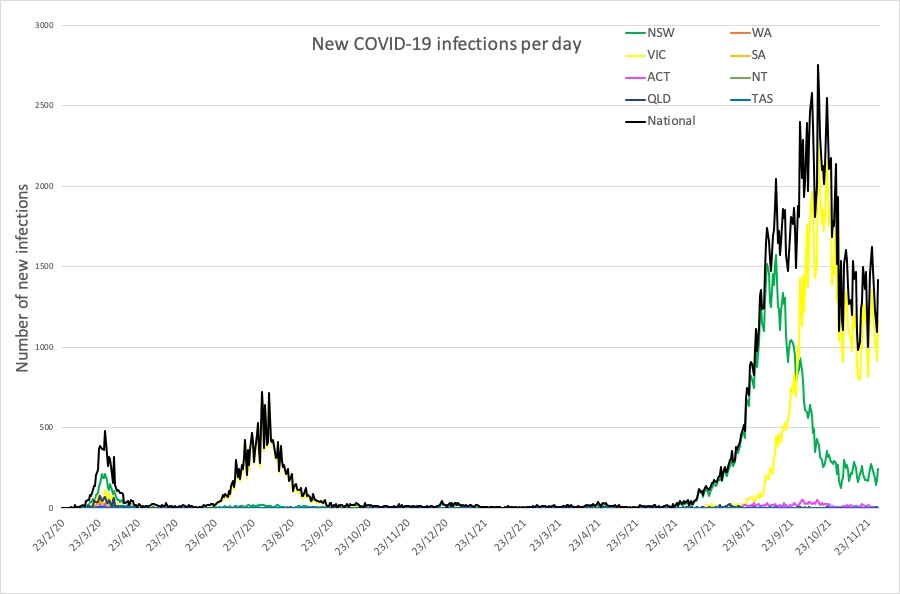And children with poorly-controlled asthma at greater risk of covid hospitalisation.
Welcome to The Medical Republic’s Covid Catch-Up.
It’s the latest covid-19 news in one convenient post. Email bianca@biancanogrady.com with tips, comments or suggestions.
2 December
- AHPRA flexible on mandatory CPD training interrupted by covid.
- Children with poorly controlled asthma at greater risk of covid hospitalisation.
- TGA provisionally approves tocilizumab for covid.
- Greg Hunt to bow out at next election.
- Latest on the covid vaccine rollout.
- Latest covid infection numbers from around Australia.
Health practitioners who have not being able to complete mandatory CPD training required for their registration because of the pandemic have some flexibility to do so in the next registration period, says AHPRA.
In response to enquiries from practitioners who have been unable to undertake programs such as occupational violence or advanced life support training, AHPRA and the National Board have issued updated advice saying they will “not take action if you have not been able to complete CPD due to the exceptional circumstances of COVID-19.”
“If you have not met the CPD requirements due to the impacts of COVID-19 you should update your CPD plan (where relevant) to explain how you will address any resulting learning needs, such as your face-to-face or interactive requirements, in the next registration period,” AHPRA said on its website.
However the temporary policy that eased the usual ‘recency of practice’ standards for registration during 2020 does not apply in 2021.
“Practitioners must honestly declare whether or not they have met the standards’ requirements when renewing registration in 2021,” AHPRA stated. If a practitioner didn’t meet the standard because of covid, the board won’t take action but said practitioners must “comply with your professional obligations including to recognise and work within the limits of your competence and scope of practice and to maintain adequate knowledge and skills to provide safe and effective care.”
Children with poorly controlled asthma may be at greater risk of hospitalisation with covid compared to those with well-controlled or no asthma, research suggests.
A paper published in The Lancet Respiratory Medicine reports the outcomes of a retrospective cohort study of 4339 children aged 5–17 years old with asthma, and 40,231 without asthma, who tested positive for SARS-CoV-2.
Overall, children with asthma had a 49% greater risk of being admitted to hospital with covid than did children without asthma. However children aged 5-11 who had had a hospital admission for asthma in the previous two years – suggesting their condition was not well managed – had a nearly 3.8-fold greater risk of hospitalisation with covid than did those with no asthma. Among those aged 12-17 with a recent asthma-related hospital admission, the risk of hospitalisation with covid was around 10-fold greater than in those without asthma.
Similarly, children who had received two or more courses of oral corticosteroids in the previous two years had a significantly higher risk of being admitted to hospital with covid than did children without asthma.
The authors suggested that children with poorly controlled asthma should be considered a priority for covid vaccination. “This analysis also underscores the importance of maintaining good asthma control and careful monitoring of children with poorly controlled asthma if they develop SARS-CoV-2 infection,” they wrote.
The monoclonal antibody tocilizumab, normally used to treat arthritis and other inflammatory conditions, has been provisionally approved in Australia as a treatment for adults hospitalised with covid.
The Therapeutic Goods Administration approved the treatment for patients on systemic corticosteroids as well as oxygen or ventilators, based on short-term data suggesting its blocking the inflammatory action of cytokine interleukin-6 reduces the duration of hospitalisation, risk of ventilation and risk of death in severe covid.
TMR’s Penny Durham writes: It’s the start of a long goodbye for Health Minister Greg Hunt, who has announced today that he will quit the post and politics at the next federal election, due by May next year.
That means he will see through the bulk or at least the bedding-down of the vaccine booster program, and his successor is likely to inherit smoother processes for dealing with new variants.
Mr Hunt has been denying he’s about to quit for months now, but this poorly-kept secret was all but confirmed by The Australian Financial Review yesterday. He has been in the federal cabinet since 2013 and has held the Health portfolio since 2017.
Treasurer Josh Frydenberg was quoted as saying: “The fact that Australia has one of the lowest mortality rates in the world and the fact that we have one of the highest vaccination rates in the world is in due to no small part to the incredible work that all health professionals have done across Australia, and Greg as the Health Minister, on this once-in-a-century pandemic, has been outstanding.”
Two-thirds of Australians aged 12-15 and nearly 98% of those aged over 70 are now doubly-vaccinated against covid.
The number of people still unvaccinated is dwindling: less than 1% of over-70s and less than 8% of those aged 16 years and over haven’t had a single dose of vaccine:
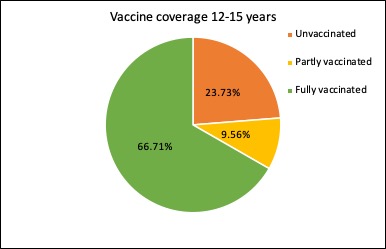
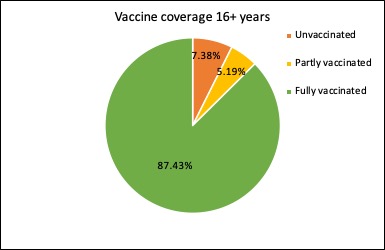
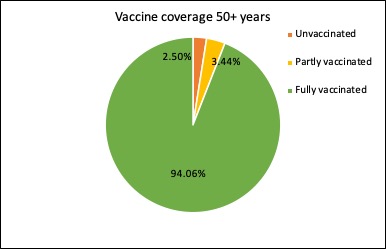
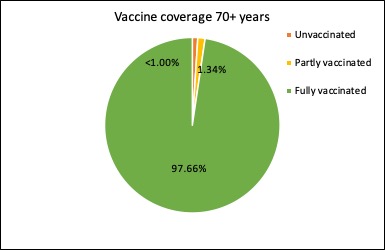
Here are the latest covid infection numbers from around Australia to 9pm Wednesday:
National – 211,654 with 2011 deaths
ACT – 2134 (4)
NSW – 81,916 (242)
NT – 289 (0)
QLD – 2130 (3)
SA – 934 (2)
TAS – 240 (1)
VIC – 122,890 (1163)
WA – 1121 (0)
